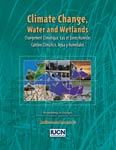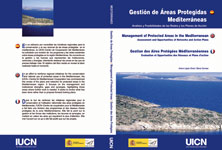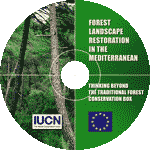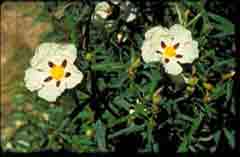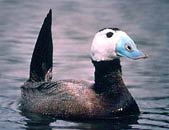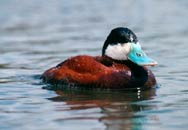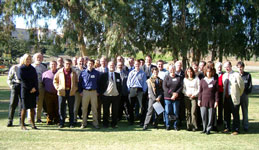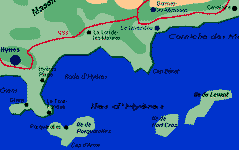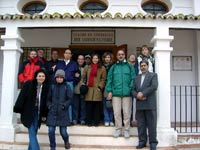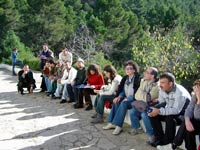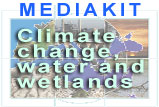

| Core support to the activities of the IUCN Mediterranean office is provided by the Junta de Andalucia, and the Ministerio de Medio Ambiente, Spain. |
Summary1. Introduction
1. IntroductionThe IUCN Centre began working on 1 October 2001 and this activity report for 2003 intends to bring IUCN members and partners in the region up to date with activities carried out in our third year of operation. The Centre receives core support from the Junta de Andalucia (Consejería de Medio Ambiente) and the Ministry of Environment (Spain), which we acknowledge with grateful thanks. Most of the areas in which we have focussed in 2003 deal with the reinforcement of capacity (both inside and outside the office) and launching pilot activities to build a regional constituency, identifying how best to respond to the regional needs and context, adapting and adopting IUCN procedures to our local reality, while building working and personal relationships with key Spanish and Mediterranean partners. Memoranda of understanding have been signed with local partners, Diputacion and Ayuntamiento de Malaga, and with regional partners UNEP – Mediterranean Action Plan. In addition to this we have run a series of activities to demonstrate IUCN’s added value and to begin to work closely and build good working relations with key regional partners, IUCN National Committees and IUCN members. Not least we have also developed innovative ways of working with the European and WesCANA programmes, regional commissions and global thematic programmes in a cross cutting manner as this programme is unique within IUCN in developing an ecosystem approach to programming. (1).
1. In that respect it is worth mentioning that the Mediterranean programme is conceived as a regional thematic programme, and does not seek to replace or duplicate any ongoing RoFE or WesCANA programmes in the region.
In addition to these structural issues the Centre also began running technical activities that are described in more detail below.
2. Programme development and implementationThe 2002-2004 strategy for the programme envisages a set of key results in different programme areas, and the table below summarises key result areas where progress has been made during 2003. Much of 2003 has been devoted to programme design, implementation of pilot activities, and linking up with IUCN global events, such as the World Parks Congress (Durban Sept 2003) definition of priorities and seeking linkages with regional policy processes and with IUCN members in the region.
Table. Mediterranean results areas from the 2002-2004 strategy where progress has been made in 2003.
Transboundary Areas of biodiversity importanceIn the spirit of IUCN Congress resolution 2.46 “Protected areas of Mediterranean and international importance” IUCN contracted to the emerging WesCANA Biodiversity centre in Lebanon a study to assess the information available and identify sites of biodiversity importance straddling national boundaries of countries in the south and east of the region (2). The consultants contacted members and sought to gather appropriate data by questionnaire with only limited success. It quickly became clear that for many countries, especially in the South and East of the basin, transboundary issues are extremely sensitive, and even though the focus of the study was on the scientific aspects of biodiversity the data was hard to collect. This project was therefore abandoned uncompleted. 2. The northern shores have already been covered in a previous WCPA activity – Transboundary PAs in Europe
Promoting integrated catchment management through environmental flowsThe diagnosis on freshwater management issues in the Mediterranean and the potential role of IUCN were developed in a draft paper which was circulated and then discussed and complemented in a Workshop (Malaga 8-9 April 2002). In 2003 work focussed on linkages with the Water and Nature Initiative of IUCN, especially addressing the issue of Environmental Flow Requirements within the framework of integrated catchment management. 8 case studies from different Mediterranean countries were contracted (Spain, France, Italy, Turkey, Slovenia, Tunisia, Lebanon, Morocco) and these documents give an overview of how EFR is being addressed regionally. In addition papers on strategic interactions with partners, EFR specificities in the Mediterranean and linkages with the global book entitled “Flows” were also developed. Within Spain, IUCN has worked towards a partnership with local institutions involved in the management of the Rio Guadalhorce to assist in ensuring that river basin management is economically, socially and environmentally sustainable. The programme is also building working links with a new regional partner – the Mediterranean network of Basin Organisations, based in the Confederacion hidrografica de Jucar.
North-South Links with MoroccoAn IUCN mission identified in October 2002 the development needs of key parts of the N. Moroccan coast if biodiversity conservation, and sustainable natural resource use is to underpin local economic development. A project portfolio of 33 projects of around 9 million euros in total has been proposed by local partners through a transparent consultation process, and assessed by the mission that was supported by the Département des Eaux et Forêts in collaboration with the Moroccan National Committee of IUCN. Project proposals are as diverse as upstream sewage treatment for pollution affecting important biodiversity-rich wetlands, through to definition of important plant areas for local endemics, or ideas for environmental education. Donors have been informed of this portfolio to facilitate bringing together project proponents with potential donors.
Adaptation to Climate change
To date much of the international and national work on climate change has focused on reduction of GHG emissions, rather than adaptation to climate change per se. Attention is now shifting to adaptation planning, as called for under the UNFCC. IUCN developed a collaborative programme to assist eight Mediterranean countries in their efforts to better integrate climate change considerations in their water and wetland resource management policy and practices; and, to advance climate change adaptation planning in a manner consistent with the United Nations Framework Convention on Climate Change (UNFCCC) and compatible with the Ramsar Convention. Under the Mediterranean component of the programme, country baseline studies were prepared for Cyprus, France, Greece, Italy, Morocco, Spain, Tunisia and Turkey. These studies, together with 4 papers on crosscutting themes (floods, droughts, water resources planning, and wetlands), informed a regional roundtable discussion with 85 participants held in collaboration with the Global Water Partnership in Athens in December 2002. The "Dialogue on water and climate" provided financial support for the initiative through WANI. In 2003, these reports have now been translated in to English, French and Spanish and published as a full resource package on this issue, and follow-up activities with different partners are being discussed.
World Parks Congress in Durban
The IUCN Mediterranean programme has been using the IUCN World Parks Congress as a vehicle for beginning work on Protected Areas in the Mediterranean region, promoting interactions with World Commission on Protected Areas, developing partnerships and raising funds. Through 4 preparatory workshops and a major Mediterranean protected area meeting IUCN has been able to mobilise 250 people, 6 donors, and experience from 15 countries to discuss Mediterranean specificities, provide inputs to Durban, and to assess how the Durban process can reinforce protected area management in our region. The four key themes identified for the Mediterranean were:
2. Training - New skills for a new century 3. Governance – new ways of working together 4. Gaps in the protected areas system
These themes were debated over 2 days in the Murcia Conference on protected Areas, organised in partnership with the CEMACAM and the Region of Murcia, and then fed into the Durban World Parks Congress where the Centre organised a series of Mediterranean events to ensure that the regional vision and perspectives were reflected in the conclusions of the Congress
BOOK jointly published by IUCN and the Organismo Autónomo de Parques Nacionales of the Environment Ministry in Spain. Overview of Mediterranean Networks and Action Plans for the Management of Protected Areas
Shark Conservation in the Mediterranean regionWorking with SSC- Shark Specialist Group (SSG) and the Regional Centre for Specially Protected Areas of the Barcelona Convention, IUCN is building regional capacity to address the assessment and conservation of threatened sharks. A red listing workshop on the Mediterranean level has been undertaken in San Marino, and IUCN through its specialist group has contributed significantly to the policy discussion on shark finning policies.
Forest landscape restoration in the Mediterranean
The concept of Forest Landscape Restoration (FLR)
is being promoted by IUCN, WWF International
and various other partners and governments. However, this is not
a new idea. It builds on a number of existing rural development,
conservation and natural resource management principles and approaches,
bringing the together to restore multiple forest functions to degraded
landscapes. The workshop has established a network of experts at the regional level, as well as gathered diverse examples of Forest Landscape Restoration initiatives. This has set the information platform for developing a regional approach relevant to this issue.
Linkages with the Barcelona ConventionThe agreement between the donors and IUCN stipulates that the IUCN Centre for Mediterranean Cooperation shall support the work of the Barcelona Convention. In this regard the Centre offers technical advice, using IUCNs Commission networks, to the following activities:
2. Action Plan for invasive species 3. Strategic Action Plan for Mediterranean Biodiversity 4. Mediterranean Commission for Sustainable development The first three action plans were agreed at the Plenipotentiary meeting of the Parties held in Sicily in November 2003. At the same occasion a 2-year MoU was signed between IUCN and the Mediterranean Action Plan – this MoU creates a framework for collaboration between MAP and IUCN that formalises the informal working relationships developed over the last two years. IUCN presented information papers on sharks and on invasive species to technical meetings of the Barcelona Convention.
Support to the implementation of the provisions of the Convention on Biological Diversity
At the COP6 meeting in The Hague in April 2002, parties adopted Decision VI/9 Global Strategy for Plant Conservation for implementation by 2010. IUCN has organised a workshop with the SSC Mediterranean Island Plants Specialist Group and Planta Europa (an IUCN member based in UK) to promote plant red lists in the Mediterranean and identify Important Plant Areas (IPA) within the region (notably in countries with foci of high endemism) as a contribution to assisting contracting parties implement their commitments under the CBD. The Mediterranean region is especially rich in plant species and is recognised as a global biodiversity hotspot. In consequence, at least one national project, in Lebanon, has been developed to identify IPAs and others are under discussion. Defining important plant areas in the Mediterranean region
Developing a national action plan to control alien Ruddy Ducks in Morocco
At the request of the Moroccan government, IUCN organised a national workshop in Rabat to discuss the framework for a National Action Plan to control the Ruddy Duck, that originates in N America but breeds in the wild and hybridizes with the globally threatened White Headed Duck. The governments and biologists of Spain, UK and France, together with experts from the SSC Threatened waterfowl specialist group, participated to share their experiences of this issue and assist Morocco in developing an effective plan. Plan d’action pour le contrôle del’Erismature rousse au Maroc, 2003 – 2005.
Assessing the legal situation of High seas marine protected areasIn January 2003, 45 participants came together in Malaga from around the world to discuss how to develop and implement High Seas Marine Protected Areas, at the invitation of WWF and IUCN. A strategy was developed, that is now being followed up and implemented in the Mediterranean region, and which focuses on improving legal tools. A review of the legal controls on navigation has been undertaken through a case study of Bonnifacio (a marine protected area between Sardinia and Corsica), and this has supported the emergence of a network of marine environmental lawyers throughout the region that can also interact with the new Sub group of the Environmental Law Commission, and the High Seas Marine Protected area working group of WCPA on related topics. The IUCN team has also strengthened linkages with other regional conventions dealing with these issues to promote a harmonized approach (eg Helsinki Convention – Baltic Sea, Barcelona Convention – Mediterranean, OSPAR – NE Atlantic).
The international marine park of the Mouths of Bonifacio. Relevant perspectives in international law
Managing populations of Barbary Macaques in MoroccoThe Moroccan Government has requested the assistance of IUCN to address the management of Barbary Macaques in Morocco and the interaction between the apes and local human activities, as well as their impact on cedar forests. Barbary Macaques are restricted to three areas of the Western Mediterranean in Morocco, Algeria and Gibraltar, and are considered by the IUCN SSC Primate Specialist Group to have a declining population. An IUCN mission will work with local biologists and managers to design a medium term management policy for the species and their habitat.
Promoting sustainable fisheriesIUCN has developed a programme and information paper on shark-finning that has contributed to the ongoing policy discussions in the EU concerning this fishery that is widely considered unsustainable and wasteful as fins are kept for export, but bodies are often discarded at sea. A shark media kit has also been designed to help raise awareness of the issues, and the red-listing process for Mediterranean sharks, hosted by San Marino, has laid the basis for objective scientific assessment of their status at Mediterranean scale. Information Paper on Marine Invasive Species
Advanced seminar on Protected Areas ManagementIn partnership with the Agencia Espanola de Cooperacion Internacional (AECI), IUCN organised a 2 week advanced seminar in Andalucia for 26 participants from AECI beneficiary countries and from Spain. The programme involved a wide range of Spanish IUCN members and partners (eg. Organismo Autonomo de Parques, Diputacion de Barcelona, Diputacion de Malaga, Consejeria de Medio Ambiente de Andalucia, Donana 2005 etc) sharing their experiences on Protected areas management, as well as addressing elements of the Durban Accord form the World Parks Congress. The work focused on considering protected areas as an opportunity, and not as a limitation, for local development. The conservation and preservation of Mediterranean protected areas, including the local population in the decision-making processes, constituted one of the main objectives. In addition, the establishment of links and joint activities among Mediterranean countries, organisations and bodies allows for joining efforts, promoting consistency and efficiency in the context of sustainability for protected areas and strategies for socio-economic and environmental development. Agenda 21
Informe del seminario avanzado sobre áreas protegidas
Supporting the management of Ichkeul National ParkThe Tunisian Government requested IUCN’s support for the management of Ichkeul National park, a UNESCO World Heritage Site. IUCN worked with international and local specialists to develop a set of indicators that can guide a monitoring programme for the management and restoration of the site as requested by the World Heritage Committee. These were debated in an international workshop hosted by the government that laid the basis for future policies and management and monitoring activities in the National Park and its catchment. Cadrage du
Plan de gestion de l’Ichkeul
Involvement of IUCN Members and Commissions in the programmeThe IUCN Centre for Mediterranean cooperation is pursuing partnerships with a range of IUCN members, IUCN Commissions and regional organisations in implementing its programme. Emphasis in 2003 has been placed on promoting regional activities and participating in key regional fora to make IUCNs presence and technical contribution tangible and visible. Due to our presence in Andalusia, the Centre has also sought to establish relationships with key Spanish and Andalusian institutions in different thematic areas, as well as developing working linkages with other Autonomous regions of the Mediterranean coast. The Executive Committee of the Species Survival Committee met in Malaga in October 2003 and Mediterranean work is ongoing with 8 of the SSC specialist groups (Threatened Waterfowl, Cetaceans, Sharks, Sustainable Use, Plants/Mediterranean Island Plants, Primates, Invasive species). The Centre increasingly works with the Commission on Environmental Law through a network of marine lawyers addressing the challenges of Mediterranean High Seas Marine Protected Areas, and with the World Commission on Protected Areas (European and WesCANA sections).
Communication activities
During 2003 the communications of the Centre have been consolidated. Regular electronic bulletins are sent out to members (in English, French and Spanish) for information and to encourage their participation in the programme; the web site has been designed following IUCN’s corporate image and is regularly updated with news, events and reports; and relations with the press are improving as we associate our communications strategy with major regional or global events (eg. Ramsar Convention, Johannesburg WSSD etc). 15 press releases linked to ongoing activities have been distributed to the press. The website records around 8,000 visitors per month, and a total of 72,000 documents have been downloaded from the site in 2003. 15% of visitors return for a second visit or more. The website therefore continues to play its role in disseminating IUCN results and this can be expected to increase as new results are posted on a regular basis. Actividades
de Comunicación 2003 Documents downloaded 2003 (as at 4 December)
3. AdministrationStaffDuring 2003 the staffing of the office has been consolidated and in 2003 the following positions were occupied:
4. Outlook for 2004The 2003 programme continues to build on activities begun in 2002 and 2003 to meet the Mediterranean results laid out in the strategy. The major IUCN event for this year is the World Conservation Congress in Thailand in November and much of our energies at regional level are focussed on the Mediterranean membership consultation planned for June 2004. During 2003, IUCN as a whole has initiated the planning process for the 2005-2008 programme that will be discussed in Thailand at the 2004 World Conservation Congress. The Mediterranean programme has consulted members on its draft situation analysis that analyses key environment and development challenges for the Mediterranean region, and drafted a 2005-2008 programme during 2003. | summary | home | |
||||||||||||||||||||||||||||||||||||||||||||||||||||||||||||||||||||||||||||||||||||||||||||||||||||||||||||||||||||||||||||||||||||||


